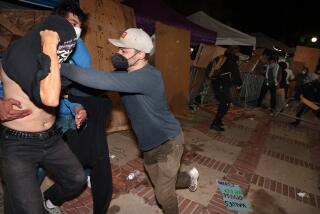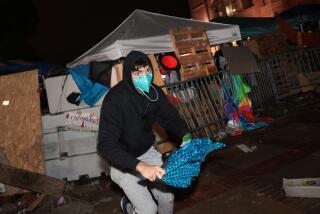Caught up in violence of L.A. riots, victim has lasting empathy
- Share via
HONOLULU — Craig Fujii spent the night of April 29, 1992, in two increasingly chaotic L.A. emergency rooms.
On his right temple throbbed a large, ugly lump, striped with swollen veins. His head hurt, he kept saying, over and over.
The young Associated Press photographer had been beaten up at Florence and Normandie.
Someone had yanked off his cameras. He’d been kicked, his glasses smashed.
As he was finally being seen at Cedars-Sinai Medical Center, firefighters in bloodied gear rushed in with one of their own who had been shot in the face.
Fujii found this out later, along with other chilling details: that he was beaten about 10 minutes before Reginald Denny, not 10 yards from where Denny had been violently dragged from his truck; that he and Denny seemed to have at least one attacker in common.
Fujii got banged up. He had a concussion and a nasty shiner. It took months for the knot on his temple to recede.
But in time, what he came to feel was grateful.
He was not permanently damaged, not dead. He was just one of the injured thousands, a bit player in a big moment in history.
As such, he could decide how much to let one awful experience take hold of him.
From the start, his mind seemed to be helping him make the choice.
Fujii had been handed what he calls “a crazy gift.” He could remember only the edges of what had happened to him.
“If you were just going to replay something over and over, a bunch of people coming at you and swinging at you and hurting you — if you had to replay that over and over in your brain, if you kept seeing it over and over, that’d be horrifying,” he said. “The beauty of the way our brains work is sometimes we don’t remember things that are horribly bad.”
::
Fujii’s memories of April 29, 1992, are like shards of glass — each individually sharp, but far too few to reconstruct into a whole.
He is driving surface streets to the Forum, to shoot a Lakers playoff game, when he hears on KFWB about the crowd at Florence and Normandie. He thinks, it’s pretty much on the way, he can go grab a few quick photos, then head on to the game. He doesn’t call the office. (“I go cowboy.”)
He is standing with others, staring at Tom’s Liquor Store. He feels stunned and surprised. But at what? (“Was it a fire? Don’t know. Was it people running out of the store? Don’t remember.”)
He is fumbling in the back of his red Honda Civic hatchback, feeling for his spare pair of glasses. (“If you can’t see, is it still a memory?”)
He is sitting in the front seat of his car and his face hurts. It hurts so much.
The attack itself? Gone. Leaving the scene? A blank.
So much of what he knows has been filled in by others.
Somehow, it seems, he drove himself to the Associated Press bureau in downtown L.A., though once there he seemed dazed and could not say where he’d been.
“He had this huge welt, like a ping-pong ball,” said Scott Robinson, who was filing photos when Fujii walked in. “People kept peppering him with questions, ‘Where’s your car? Where’s your gear?’”
He replied with his own questions, which he kept repeating, caught in a loop:
“What’s going on?” “Am I going to be OK?” “Why does my head hurt?”
Robinson answered every few minutes as he took Fujii in search of help, first to a downtown ER crowded with gunshot victims, then to Cedars.
Fujii didn’t seem to be hearing him. So Robinson started making things up — telling him of planets colliding, spaceships landing.
It was better, Robinson said, than focusing on what he was seeing and hearing.
“It was like we were in the middle of hell, like the whole world was imploding and we were at ground zero.”
::
After the attack, Fujii was told to stay home from work. He sat in his apartment in Palms, watching TV footage of mayhem on the streets.
He was very much on edge and terribly scared. He felt violence could jump out at him from anywhere.
He also mourned what he saw as the loss of the Los Angeles he loved.
An optimistic 31-year-old born in Long Beach, Fujii had celebrated the idea of the many-colored, open-armed metropolis.
“I have this great memory of when I was a little kid, flying out of LAX and looking around and seeing people from everywhere coming to this city. They spoke different languages. They dressed differently. They had different skin colors. It seemed like such a promising, hopeful place,” he said.
“Suddenly it was all taken away, this great big melting pot that is L.A. It sort of felt like the end of the world.”
And sitting near him, as if in proof, was a handgun.
He had never shot one, never owned one, always been a pacifist. But when a worried friend called and offered him protection, Fujii was too frightened to resist.
“And here I was, me, with this stinking pistol by my side,” he said.
A week or so later, Fujii made the choice to give the gun back.
He immediately felt great relief, he said. “I mean the faster it got out of my house, the more comfortable I was.”
::
Fujii always hoped he would, in some small way, help the world.
In 1997, after a career that included two foreign stints for AP, as well as work for the Seattle Times, the Dallas Morning News, the Detroit Free Press and the Los Angeles Times, he left journalism to try to do more direct good.
He went to nursing school and then spent four years at a health clinic on a Navajo reservation in Arizona.
He is now an emergency-room nurse practitioner at Tripler Army Medical Center in Honolulu, which is its own melting pot, caring for service people and their families from all over the country.
Each shift, Fujii treats people who have come back traumatized from tours in Iraq and Afghanistan. It’s part of the stew that sometimes slops out when they show up with woes more readily reparable — a broken toe, a high fever, a gash that needs to be stitched up.
On a recent morning, Army Staff Sgt. Dane Phelps, 28, brought in his daughter Samantha, 3, who has been feverish, with a sore throat. As Samantha stuck out her tongue for Fujii and played with her purple and pink plastic ponies, a jumpy Phelps talked, with little prompting, about firefights and dead comrades and how often he was sure he would be dead soon.
He had just returned a few weeks earlier from his fifth tour of duty. He’d done three stints in Afghanistan, two in Iraq.
When Fujii suggested he stop smoking, for his health and his daughter’s, Phelps said he’d tried again and again, failing each time “the bullets cracked by.”
“We were pretty much terrified the whole damn time,” he told Fujii of his last 12 months in Afghanistan.
“I’m done with war,” he added.
Fujii says he feels a particular empathy for the many he sees with post-traumatic stress disorder who are haunted by the scariest, worst moments in their lives and are unable to stop reliving them.
“It’s an absolute accident that I didn’t end up like them, that I didn’t just stay scared,” Fujii said. “I might have PTSD myself today, but I don’t.”
::
For a while during the riots, fear made Fujii act out of character, just as anger and frustration propelled others.
He understood the rage — how many black people in the city had long felt like second-class citizens, how the Rodney King beating and the acquittal of the white officers “felt like an insult directed at a whole community.”
As for what happened to him, he always felt mostly sadness.
“I mean, if you’re going to be angry, who would you be angry at?” Fujii, now 51, asked recently. “The people who behaved this way out of pure anger?”
About a month after the incident, police questioned him. He was later called to testify in the trial of Denny attacker Damian Williams, whom prosecutors had identified as also attacking Fujii — thanks to a few seconds of amateur video they had examined frame by frame.
The video doesn’t show much, just Fujii being surrounded and yelled at and someone tugging at a camera strap. Fujii couldn’t add anything. He simply didn’t remember.
For Fujii, that day and the life he used to lead seem a world away. He lives with his girlfriend, Dara Fukuhara, in a condo 15 minutes from the beach and rarely picks up a camera except to photograph fish while scuba diving.
Even closer to home in L.A., he guesses, the anniversary’s intensity is diminishing.
“I know that memory’s there. But it’s like a scar that you’ve had for a while,” Fujii said. “It sort of fades with time.”
One in a series of stories about the 1992 riots and how they reshaped Southern California.
More to Read
Sign up for Essential California
The most important California stories and recommendations in your inbox every morning.
You may occasionally receive promotional content from the Los Angeles Times.











